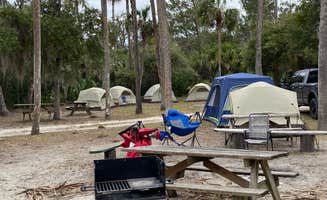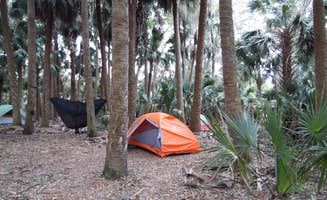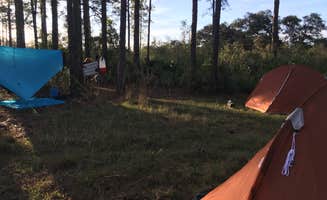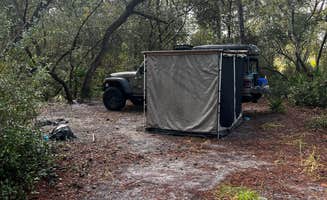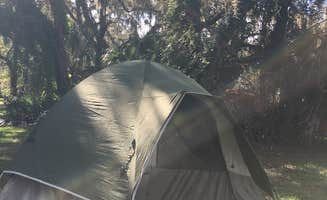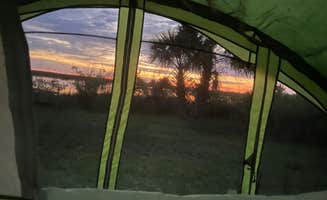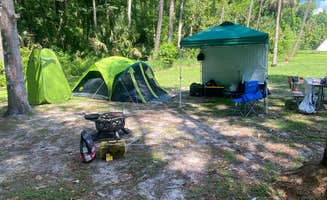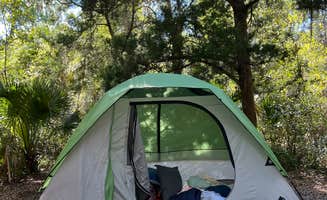Tent camping near Port Orange, Florida offers diverse experiences across coastal, riverside, and forested environments with elevations typically under 50 feet above sea level. Summer temperatures average 90°F with frequent afternoon thunderstorms, while winter camping provides milder 70°F days with significantly fewer insects. Primitive sites often feature sandy soil that drains quickly after rainfall, though some locations provide elevated wooden platforms for tent placement.
What to do
Kayaking and canoeing: At Tomoka State Park, paddlers can explore the Halifax River ecosystem. "From a fauna standpoint, there's white-tailed deer, otters, opossums, raccoons and even bobcats that come out closer to sunset as well as throughout the night," notes camper Stuart K. The park offers immediate river access where "you can eyeball some coastal inhabitants like oysters, fiddler crabs and countless birds."
Wildlife viewing: Early mornings at Seminole State Forest Primitive Campsites provide opportunities to spot native Florida species. "This is a good place to come to see the stars!" reports camper Mike G., who found the primitive area "super quiet" with ample space for both large groups and solo backpackers.
Hiking: The trail system at Little Big Econ State Forest offers miles of well-maintained paths. "You could spend an entire day just getting lost around the trails. So much fun. Not a very difficult trial though," explains Hannah S. Another camper notes the trails are "beautiful and well marked," making them suitable for beginners and experienced hikers alike.
What campers like
Privacy between sites: At Princess Place Preserve, campers appreciate the thoughtful site layout. "The sites are expansive and beautifully shaded," reports Taylor, who stayed at an equestrian site and was "amazed by how much space there was and how far we were from others." The preserve has only 13 campsites spread throughout the property.
Water access: Many campers value the direct water access at tent sites. At Bissette Bay in Canaveral National Seashore, one camper describes it as "your own island" that can be reached by launching from River Breeze Park. Stuart K. notes the fishing is exceptional: "By 6pm, I had 3 different fish being fired up on my campsite - red drum, silver mullet and spotted sea trout."
Clean facilities: Despite their primitive nature, many sites maintain clean restrooms. At Princess Place Preserve, a camper mentioned the bathrooms were "recently repainted and looked acceptably clean." Another noted the rangers were "incredibly kind" and they felt "very safe" while camping there.
What you should know
Reservation requirements: Most tent sites require advance booking, especially at popular locations. At Gemini Springs Campground, one camper noted, "We can't arrive without reservation. The office is closed." Another mentioned receiving "a gate code and bathroom code" when making reservations.
Wildlife precautions: Many campsites have significant wildlife presence requiring proper food storage. At Tomoka State Park, a camper warns to "heed all of the signs that properly warn you about both alligators and snakes – they are real, abundant with this place having had a lot of issues with people not taking these warnings seriously."
Transportation logistics: Several campgrounds require alternative transportation to reach sites. At Hontoon Island State Park, all camping supplies must be transported via "wheelbarrows provided by the parks services" after taking the ferry to the island. Some primitive sites require hikes of varying distances from parking areas.
Tips for camping with families
Playground access: Families appreciate dedicated recreation areas at some campgrounds. At Hontoon Island State Park, Sara S. observed "a great playground for the kids" along with "a nice long hike" making it suitable for mixed-age groups. Another camper mentioned the "nice pavilion for picnicking."
Site selection for comfort: Choose sites with appropriate amenities for your family's needs. Megan K. recommends Hontoon Island for its "free shuttle vans that takes you out to the actual campsite" which is helpful when camping with children and gear. She found the staff "super friendly with lots of trail suggestions."
Weather planning: Afternoon thunderstorms are common in summer months. Bring tarps for additional coverage and plan indoor activities. One camper at Little Big Econ noted that "mosquitoes do get bad on extra humid days," suggesting families should "bring bug spray in spring and early summer as the yellow flies can be brutal."
Tips from RVers
Site accessibility: While most primitive tent sites aren't suitable for RVs, some areas have designated sections. At Mangrove Cove RV Park, campers get "all the standard hook-ups (electric, waste and water)," though facilities are described as "incredibly basic, yet clean." The main attraction is water access for those with boats.
Alternative accommodations: Some parks offer cabins as alternatives to tent camping. At Hontoon Island State Park, Billy A. noted "they have cabins too" which "book up far in advance." These provide a comfortable option during inclement weather while still allowing access to the park's amenities and activities.
Local resources: Identify nearby towns for supplies and services. Stuart K. recommends checking out Goodrich Seafood & Oyster House near Mangrove Cove, "which has been around since 1910, for some outstanding views of the Indian River where they have all you can eat fish on Fridays and all you can eat Shrimp on Saturdays."


